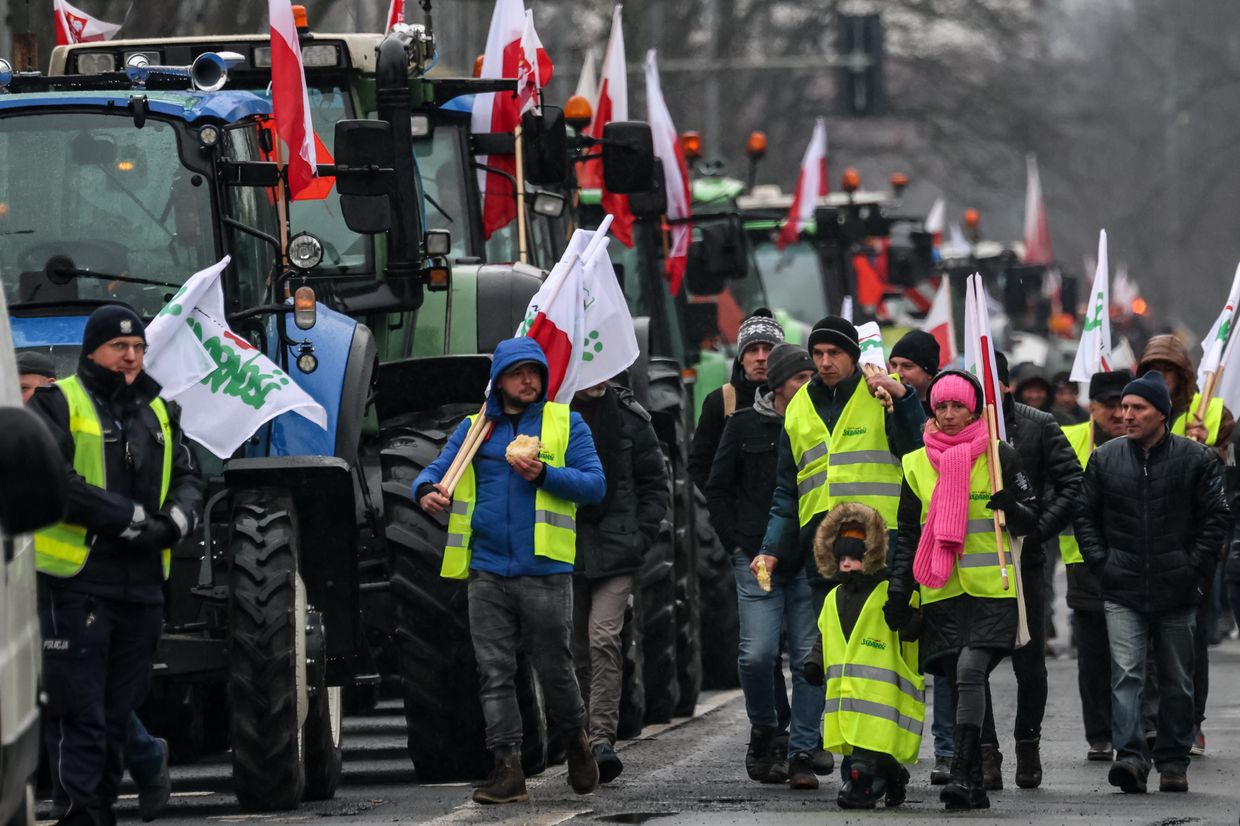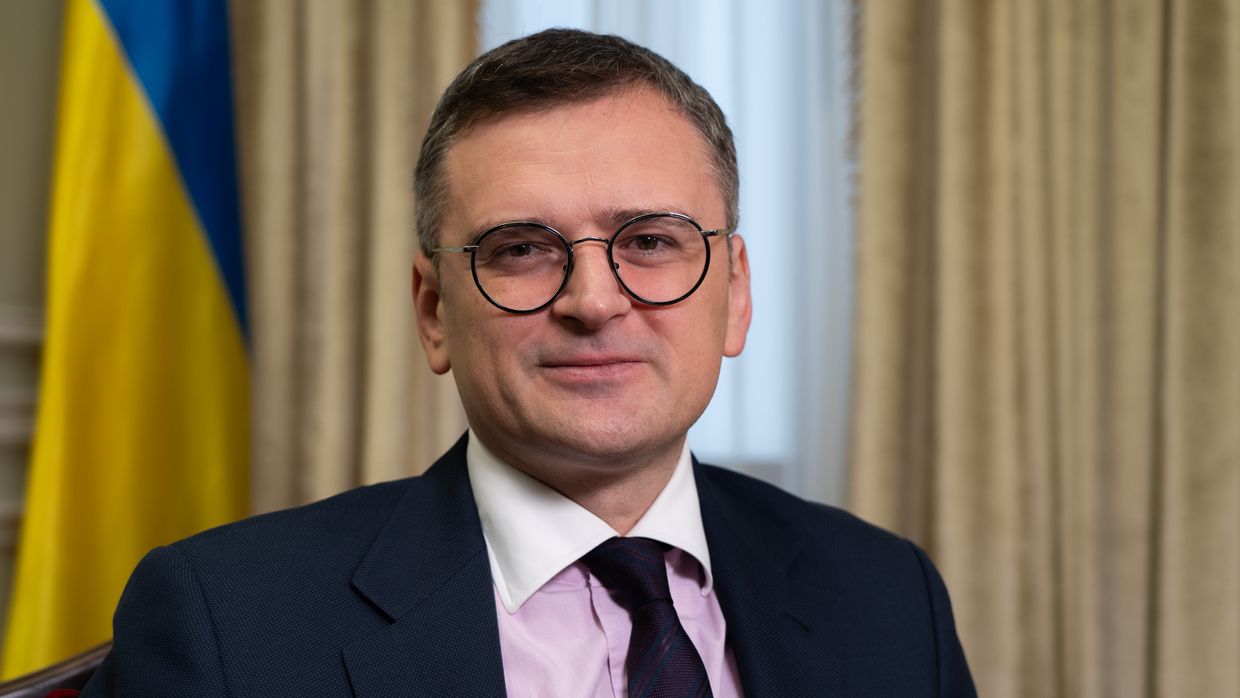Sikorski: ‘We want to help Ukraine, but you must decide how long you are ready to go on’

Radosław Sikorski, the Minister of Foreign Affairs of Poland, during an interview for The Kyiv Independent in Warsaw, Poland on April 2, 2024. (Tetiana Pavliuk / The Kyiv Independent)
Radosław Sikorski, Poland's foreign minister, wants to make it clear he stands for Ukraine's place in the European Union.
"It was during the Polish presidency of the EU – with these hands, I pushed and succeeded in closing the text of Ukraine's Association Agreement with the European Union," he emphasized during an interview with the Kyiv Independent. "This is why Ukraine now enjoys this deep relationship with the EU," he added.
But that relationship, now at its most painful and longest stage – being a candidate for membership – will be incredibly frustrating, he warns. Although, as Sikorski underscores, "the prize is worth it in the end."
Complicating things further is the fact that Ukraine de facto joined the bloc – at least in terms of agriculture markets – before formally meeting the needed criteria.
The result has been months of increasingly strained relations between the neighboring countries. Blockades on the border – first by truck drivers and more recently by farmers – have caused billions in lost revenue. In just over a month, trucker protests led to a shortfall of Hr 9.2 billion, or $243 million, in customs revenues, according to Ukraine's Economy Minister.
They have also cost at least three lives as truck drivers waited for weeks in harsh winter conditions.

Both sides have since been talking past each other. Polish authorities focus on norms and regulations Ukrainian businesses need to abide by to benefit from the access to the EU's single market. Ukraine, in turn, argues that blockades essentially help Russia in destroying Ukraine as a nation.
President Volodymyr Zelensky goes as far as saying Poland is helping Russia, infuriating many Poles.
In Sikorski's view, the problem stems from the fact that access to the EU market, first given to Ukraine in June 2022, was always meant as a temporary solution to alleviate the blockade of Ukraine's ports.
It was "an extraordinary act of solidarity with Ukraine when (Vladimir) Putin blocked the Black Sea, and you couldn't take your grain out through the Bosphorus to Africa and China," Sikorski said. "We said: 'All right. We are not going to cave to Putin. We open the border, let the grain come through the EU'."
However, much of the grains meant for EU markets ended up staying in Central Europe. This led to EU restrictions on sales to Poland, Hungary, Romania, Slovakia, and Bulgaria (following unilateral decisions of the first two) from May to mid-September 2023.
After Poland, Hungary and Slovakia decided to unilaterally extend the ban, Ukraine decided to submit (and later withdraw) a complaint to the World Trade Organization.
"Unfortunately, 2/3 of the grain that was supposed to be in transit through the EU stayed in Poland. You can imagine what Polish farmers think about that," Sikorski said.
Now, the Polish Foreign Minister argues, the situation is different.
"You have won the battle of the western Black Sea. Congratulations!" he said. "Without even having a navy, you have destroyed a third of the Russian Black Sea Fleet. You've recovered Snake Island, and your ships are now moving from Odesa, hugging the coasts of Romania and Bulgaria. I am told that the volume is back to pre-war levels," Sikorski said.

Polish Foreign Minister Radosław Sikorski during an interview with the Kyiv Independent in Warsaw, Poland, on April 2, 2024. (Tetiana Pavliuk / The Kyiv Independent)
With the acute crisis averted, Sikorski said, it is time to get back to regular EU business.
"You've essentially been let temporarily into the single market without negotiation and without having to fulfill all the European Standards," said Sikorski, adding that Polish farmers can't use some of the fertilizers that are legal in Ukraine, creating an unfair advantage.
Many Ukrainians see things differently.
Slow-drip arms supplies have left the country vulnerable to a Russian offensive, and depleted air defenses no longer keep up with endless bombing campaigns.
In this context, Polish protests feel like a stab in the back – especially when combined with such actions as spilling Ukrainian grain, which carries symbolic importance tied to the Holodomor, the Soviet man-made famine that killed millions.
"You are fighting for your life. We sympathize with you, and we know it's dramatic. But you also need to understand us. We cannot use violence against our farmers," Sikorski said.
Fighting Russia as a democracy
Asked about the role of Russian disinformation campaigns, both among Polish farmers and across the EU via such projects as the recently uncovered Voice of Europe propaganda network, Sikorski acknowledges this plays a role. Russian propaganda – including Russia Today (RT) and Sputnik – was allowed to fester for years, and the "seeds planted years ago still bear poisonous fruit," Sikorski said.
But there are limits to how democracies can fight this, Sikorski added. "We are open societies. Autocracies can do things, for example, banning things. We cannot do so. So we need more mature, better-informed citizens," he said.
Despite the blockades and the various Russian disinformation operations, Sikorski believes Ukraine has won the information battle in most of Europe. But he is worried about the situation among the countries of the Global South, as well as places like the Vatican, where Russian narratives are leading. He said he mobilized Poland's diplomatic corps to help with this.
"Polish ambassadors have called on the Ukrainian colleagues and asked them what they can do together to make the case that this is a colonial invasion and that countries of the Global South should understand this and, therefore, sympathize with the victim of the colonial aggression," Sikorski said.

Although Sikorski is broadly seen as a Russia-hawk on the European scene, it is clear the sense of urgency in the EU and Kyiv differs.
One of the starkest examples revolves around shell production: the EU earlier committed to deliver 1 million 155mm shells by March 2024 but has only hit half that number so far.
Sikorski is optimistic. "I am told that by the end of the year, Europe will be capable of producing a million shares per annum. It's not yet what Russia produces, but it's more than today," the foreign minister said. "We are now spending serious European money on new production lines. There was an EU ammunition program of 500 million euros for this purpose."
From Ukraine's perspective, though, the key is surviving until the end of the year. As Zelensky noted recently, without U.S. arms, Ukraine risks "losing the war."
"The democratic West is always behind the curve on issues like that. Because we didn't want this war. You didn't want this war. Because, as democracies, we just want to be left to ourselves," Sikorski explained, but adding that once the West mobilizes fully, Russia will come to regret it.
"Russia had already taken all of the West as an adversary and had lost the Cold War. It has done it again from a smaller demographic and industrial base."
Asked about arguments that Ukraine has already achieved a victory of sorts, and should now look to settle, Sikorski said this choice is in the hands of Ukrainians.
"You have to decide that. It's your democratically elected president, your parliament. It's your people who are suffering. It's your children who are being stolen. It's your citizens who are under russification. I don't think I am in a position to tell you what you should do," Sikorski said.
"We are good friends. We want to help you in this emergency, but you must decide how long you are ready to go on," he added.
Jakub Parusinski is the director of KI Insights, a political and economic research and advisory organization backed by the Kyiv Independent. Visit insights.kyivindependent.com to learn more and subscribe to the KI Insights weekly newsletter.












